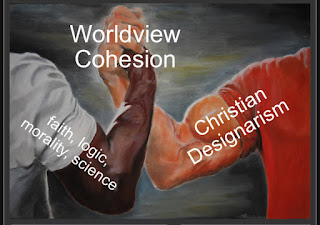1. Faith: Christian Designarism begins with the belief in a personal, intelligent Creator—God—who designed the universe with purpose. This faith is not a blind leap but is supported by the logical coherence and historical reliability of the Christian worldview. Faith fills in where human reason reaches its limits, particularly in areas like morality, meaning, and our understanding of eternity.
2. Logic: The foundation of Christian Designarism is rooted in the belief that the universe operates under consistent laws of logic and reason, which reflect the orderly mind of God. This contrasts with a naturalistic worldview that struggles to account for the very existence of logic in a universe supposedly born from chaos or randomness. Logic and reason, far from being the enemies of faith, are viewed as reflections of God’s rational nature, supporting concepts such as the fine-tuning of the universe and the ordered complexity of life.
3. Morality: Christian Designarism posits that objective moral values exist because they stem from God’s nature. The moral order we observe—principles of justice, love, and human dignity—points to a Designer who has embedded these values in creation. This contrasts with moral relativism often associated with naturalism, where morality becomes subjective and culturally dependent, lacking a universal foundation. Christian morality isn’t just ethical guidelines but part of a larger design intended to reflect God’s character and bring about human flourishing.
4. Science: Science, within the framework of Christian Designarism, is viewed as a means to discover the intricacies of God’s creation. This view allows for an open exploration of both natural and intelligent causes. Unlike Methodological Naturalism, which limits explanations to purely natural causes, Christian Designarism acknowledges that some features of the universe—such as the fine-tuning for life, biological complexity, and the origins of consciousness—points to a purposeful design. Far from stifling science, this approach enhances scientific inquiry by allowing for a broader range of explanations based on evidence.
In this synthesis, Christian Designarism sees no conflict between faith, logic, morality, and science; rather, it proposes that these domains are harmonious when viewed through the lens of design. The universe’s order, human morality, and our capacity for reason all point to a Creator who not only initiated the cosmos but remains actively involved in its purpose.

Comments
Post a Comment